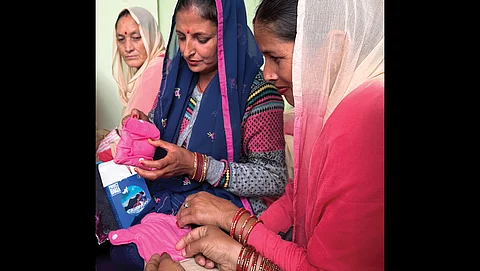

Ever since she came of age, Sarita Devi would collect the sanitary pads she used each month and burn them in her backyard. This was common practice in her village of Narwana Khas, Dharamshala. “Some girls and women did not burn the pads but disposed of them in dumpsites or waterbodies. We did not know where it all ended up,” she says.
But things saw a change in 2021, after Sarita Devi became gram pradhan. “Soon after I took office, people from Waste Warriors met me and explained how polluting the plastic-based pads are,” she says. Waste Warriors is a non-profit working on sustainable waste management solutions in the Indian Himalayan region. “The non-profit gave us free samples of reusable cotton pads and menstrual cups, and showed us how to use them. We realised it would be a hassle-free solution for us to work at home and in our fields,” she says.
Inspired, Sarita Devi decided to revive the mahila mandal (women’s committee) in the village that had been formed years ago but was not too active, to encourage a shift away from plastic pads. The committee held workshops to spread awareness on waste management and segregation and counsel girls to opt for cloth pads or menstrual cups. Some 600-700 women and girls from Narwana Khas and nearby villages participated. “Not all women have become comfortable using the menstrual cup, but younger girls have opted for it,” says Sapna Kumari of the mahila mandal.
“Mixed wet, dry and sanitary waste is an environmental and human risk and handing out the pads does not change the culture and silence around menstruation. This is where workshops that focus on alternative period products play an important role,” says Diya Batra of Waste Warriors. The non-profit and residents of Narwana Khas have also set up a system for better waste collection and disposal and ensured insulation of incinerators in schools for proper disposal of pads.
The initiative has spread. “I conducted a door-to-door campaign and encouraged women to participate in the workshops. People now think twice before using and throwing away not just pads but also diapers, and are considering buying the reusable products online,” says Tanu of Sokhni Da Kot village in Dharamshala.
Vimla Devi and Ritu Devi, daily-wage workers from Bir Billing village, say reusable products help them spend long hours at work and in their fields. “While menstrual cups were difficult to use at first, once we became comfortable, it made the day easier and decreased the stress of finding places for pad disposal,” adds Ritu Devi.
Sarita Pradhan says this change in mindset has been possible only because of the gendered approach. “I believe that a male pradhan would not have taken this as a serious issue, and not many women would have cooperated with him. I am glad I got this opportunity,” she says.
This was originally published in the 1-15 June, 2025 print edition of Down To Earth